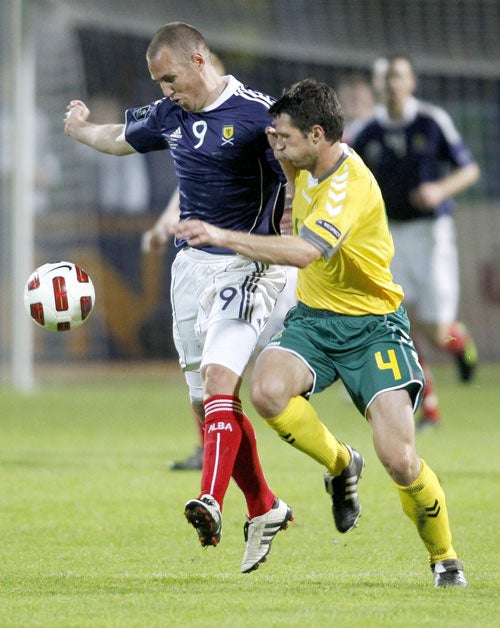Scotland must find home fire to keep hopes alive
New manager Levein's side are under pressure after failing to score away again

Your support helps us to tell the story
From reproductive rights to climate change to Big Tech, The Independent is on the ground when the story is developing. Whether it's investigating the financials of Elon Musk's pro-Trump PAC or producing our latest documentary, 'The A Word', which shines a light on the American women fighting for reproductive rights, we know how important it is to parse out the facts from the messaging.
At such a critical moment in US history, we need reporters on the ground. Your donation allows us to keep sending journalists to speak to both sides of the story.
The Independent is trusted by Americans across the entire political spectrum. And unlike many other quality news outlets, we choose not to lock Americans out of our reporting and analysis with paywalls. We believe quality journalism should be available to everyone, paid for by those who can afford it.
Your support makes all the difference.Already, Scotland are trying to suppress a feeling of dismay. The Euro 2012 qualifiers have only just kicked off but a sense of anxiety has asserted itself, recognisable as the mood that comes to characterise every campaign. Under a new manager some old traits, and some old failings, were revealed again to be the stubborn heart of the national team.
The 0-0 draw in Lithuania on Friday night echoed past indiscretions. It was the sixth consecutive away game in which Scotland have failed to score, and the players walked slowly off the pitch, slouching and wearing hangdog expressions.
Scotland need to defeat Liechtenstein on Tuesday at Hampden, an outcome that was already expected but which will now be sought with a little more tension. Against Lithuania, Craig Levein's side dominated for long spells and were ruggedly compact in a 4-1-4-1 formation that offered the hosts scant encouragement. But, as all recent Scotland managers have discovered, being organised and disciplined does not allow much room for creativity.
Levein left James McFadden on the bench until deep into the second half and Graham Dorrans, the West Bromwich Albion tiro, did not even make it on to the field. Instead, the industry and steeliness of Steven Naismith and Barry Robson were preferred on the flanks.
Scotland created a few half-chances, with Kenny Miller's impressive scoring form for Rangers not quite carrying over on to the international stage; he sent the best chance, a header, straight into the arms of Zydrunas Karcemarskas, the Lithuania goalkeeper. Afterwards, Levein was angry that the home side were able to break play up by committing fouls, and blamed the Turkish ref-eree, Cuneyt Cakir, for not being more strict.
So the Scotland manager's first competitive match in charge ended in frustration, and the nagging doubt will be whether Spain and the Czech Republic, the teams the Scots are vying with for the top two places in Group One, will be similarly exasperated at this ground. For the moment, the result carries the sharp pain of an opportunity lost.
"Possibly losing that momentum [because of Lithuania's fouls] hindered us in our attempts to get a winner, but we did create a few chances," Levein said. "Allan McGregor had only one save to make, and that was after the ref failed to give us a blatant free-kick. All we lacked was a goal, but I was really pleased with the effort. We can play better, but this is something for us to build on."
Levein may revert to 4-4-2 on Tuesday night, bringing in Kris Boyd and dropping Lee McCulloch, the defensive midfielder. The alternative is keeping the same shape as against Lithuania, but using the creative impulses of McFadden and Dorrans on the flanks. Either way, the obligation is to be convincingly bold against a side who lost 4-0 to Spain on Friday and have little ambition beyond maintaining dignity in the scoreline.
The crowd at Hampden will be neurotic, and the occasion carries the potential to become brooding if Scotland do not perform with authority. Yet a side who might conceivably contain nine current or former Old Firm players, and a Manchester United regular in Darren Fletcher, should be able to cope with the accumulating pressure.
"It's the same situation for us at club level, when we are expected to win all our games," said Kirk Broadfoot, the Rangers defender. "Although we are not one of the biggest nations in the world, come these type of games we are expected to get a win. Most of the players in the squad are used to that mentality and I'm sure they will handle it."
The draw in Lithuania is not fatal, but the response on Tuesday must be emphatic – at the very least in the display – to build momentum ahead of the games away to the Czech Republic and at home to Spain next month. Scotland are coming immediately under scrutiny, of the kind that can become debilitating.
"People have to realise that it's more difficult to beat teams like [Liechtenstein] because they put more people behind the ball," Broadfoot said. "We can't moan, because we do it. Hopefully we are patient enough and the fans don't get frustrated. I'm sure we will get the goals that we need. We know we need to win our home games if we want to qualify."
Scotland still have hope, even if it is accompanied by a growing wariness.
Join our commenting forum
Join thought-provoking conversations, follow other Independent readers and see their replies
Comments